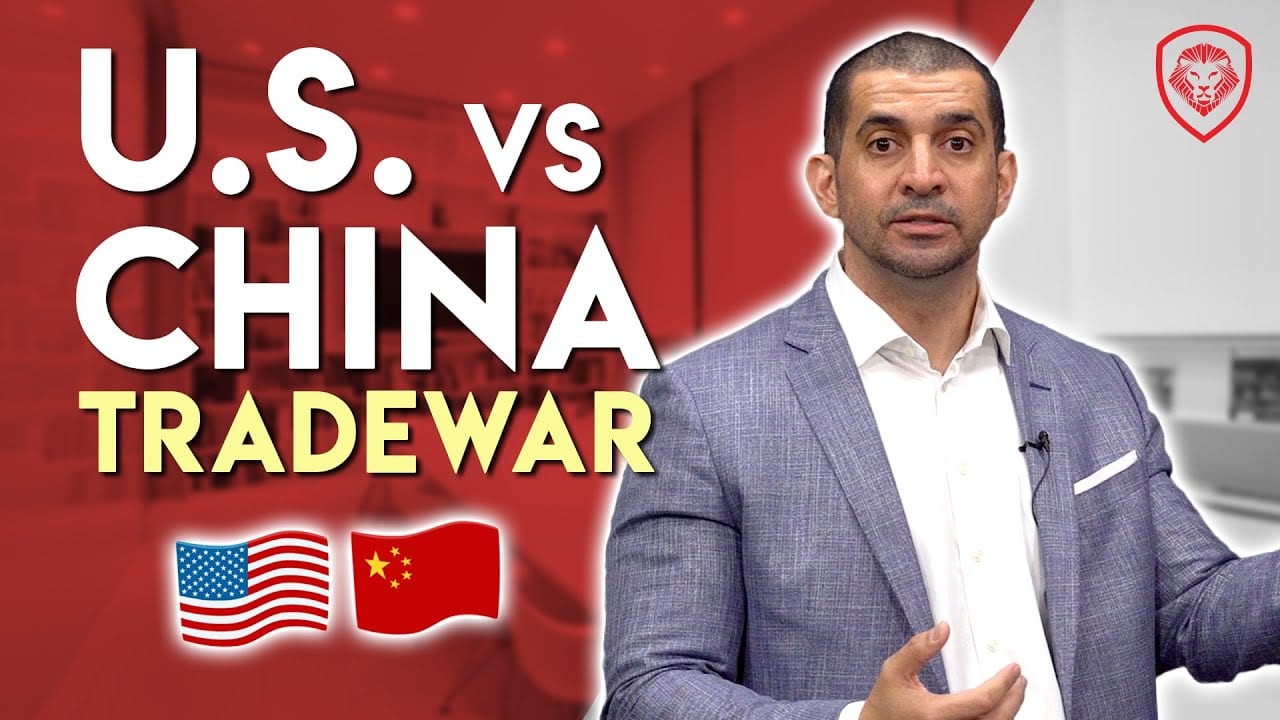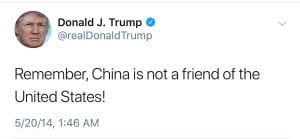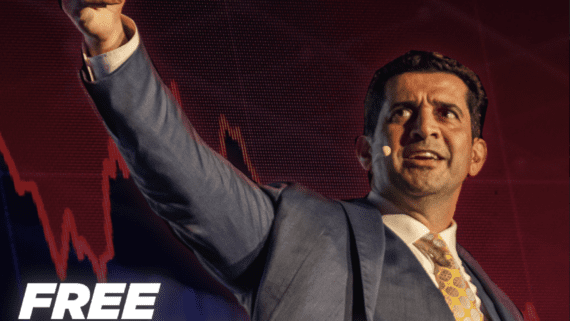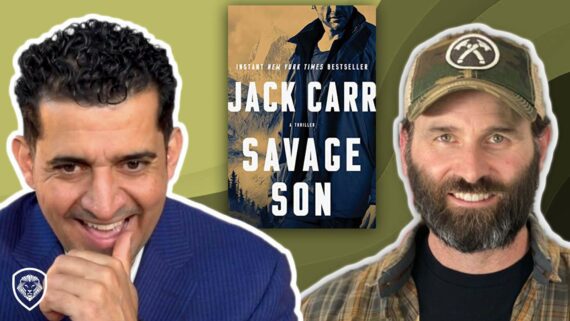US Trade War Explained -Who Needs Who?
Patrick Bet-David breaks down the US Trade War with China and what you can do about it.
There’s a lot of different kinds of wars that take place around the world. Some of them end up costing the lives, but the one we’re going to talk about, today’s a trade war. This doesn’t cost your life, but this could end up costing your job and your small business. And that is the US China trade war that is taking place. Now, having said this, in this video, we’re going to go a different angle. We’re going to talk about seven reasons why I believe this has taken place.
We’re going to talk about what Donald trumps motivation is behind this and who needs who in a lot of other factors. But the one thing that we are going to talk about as a vision that the leaders of China unveiled in 2015 to there, people talking about how China will one day be the most powerful economic empire in the world by 2025 where their currency the Yuan will be more powerful than the US dollar and a few other strategies that they had in place and the five ways of making that become a reality.
So before we get right into, let’s first talk about the word tariff, what it means and why countries put a tariff on other countries to improve their products. First a tariff is a tax. For instance, you bring your products from China to us, I put a 25% tariff on this product. So if you bring $100 billion, you’re going to have to pay another $25 billion on top of that. $100 billion. That’s the tarriff. This is why you’ll notice a lot of times where when, when people come here from Europe, they look at a Camaro and they say, oh my gosh, that’s such a luxury car. It’s an exotic car. Look at that. But Americans look at a Camaro and say it’s just a Camaro, you can buy one for $20,000 but Europeans don’t pay $28,000 they may pay $40,000 for it. Just like when Americans go to Europe and they say cab drivers driving around in a Mercedes, cops have Mercedes. Part of Tariffs is to protect the businesses in your country. So the business flows through your job creators, not somebody else’s, but you’re willing to allow them to come in and compete. So that’s a tariff.
Now, trade deficit, what is a trade deficit? This is where a big part of this war started taking place. Here’s US trade deficit. US imports $3.1 trillion in meaning countries around the world want to do business in America and America allows them to come in last year, #3.1 trillion. Now U.S gives other countries only $2.5 trillion. So $3.1 coming in, but only $2.5 going out. I think about this us, there’s only 330 million people around the world. The world has another 6.8 billion, but there’s the same amount of business being in US than out because everybody wants to be in America. So that creates a $600 billion deficit.
So president Trump is sitting there saying, well, wait a minute, wait a minute. Why are we giving them so much money and why are we not getting anything for this? Why are we not doing it in America? Why are we creating jobs over there? Why are we not keeping this to ourselves? Why are we helping their economy? Aren’t they trying to compete with us? Aren’t they coming up from like nobody to number seven, number eight, number five, number four, number three, number two, they’re wanting to compete with America. What is going on over here? Let’s find out what we produce. Well, we export grain, wheat, corn, soybean meat, pork, poultry, mechanical parts like chips, different kinds of things. China exports, electronic parts, wooden furniture, aluminum car parts, fashion accessories, handbags, seafood.
Why are we giving them so much money? Why are you doing so well? We’re helping them are only helping them become closer to us. I don’t know why this is taking place. So you know, what are the reasons for this trade war? Why are we doing this? What’s the purpose behind it? Here’s what you gotta realize.
The Reasons for Trade War
Any time you’re dealing with politics, you’re dealing with power. Motivation for business owners is money and freedom but when it comes onto politics, power is key. Then it’s economy. Then it’s politics, which is ideology. China is trying to say our ideology works because we have the kinds of people that follow what we tell them. We are leaders. We tell them what to do and they do. In America is filled with weak leaders because there are people always telling them what to do.
You know the voters always tell them what to do and you always know what America is doing. American matter of fact, everyone knows they’re bad news because that freedom of speech and to have freedom of press. Now, all that being said and done, what’s president trumps motivation? Some people are saying, why did he all of a sudden start picking on China? It’s not a new thing.
In 2014 when president Trump wasn’t president Trump, he was Donald Trump, Aka apprentice. You’re fired. Here’s what he tweeted in May of 2014 remember, China is not a friend of the United States. Look at how many likes this tweet got and it was only a retweet or 345 times.
You know what that means? Nobody was really paying attention to what he was saying about politics back then, but this China thing is not a new thing with president Trump. He’s been thinking about this for a while, so now what is he wanting to do? What’s his motivation behind this? What is he doing?
- Is it the fact that he wants to keep manufacturing jobs in the U.S?
- Is it the fact that he wants to reduce the US China trade deficit?
- Is it the fact that he still wants to keep us as a dominant power and doesn’t want to give anybody else a shot?
- Is it the the fact that he’s trying to get US out of debt? Maybe this is a way for him to learn to get out of this debt because he’s used to eliminating debt.
- Is he bullying the bully?
A lot of people are afraid of China. A lot of people are saying, well, I’m not gonna say anything because we need them. There’s only one country that maybe doesn’t need China. Then maybe China needs more than they need them, and he’s like, well, my position, I’m going to get out and say something about this and I’m going to bully the bully.
Maybe that’s what it is. Or maybe it is the vision that China launched back in 2015 to there people called, made in China 2025 and here’s what made in China 2025 was, some may say this is brilliant, some may say it’s manipulative, but all I can tell you is this 100% benefits China more than anybody else.
Part one of China’s five point game plan is:
- Setting explicit targets. Here’s what that means. Chinese government is pressure and private companies to adjust their vision to China’s 2025 vision. So saying, here’s what we’re doing. We would like you to do anything you know with your company to help us reach this vision as a whole. Which some may say, okay, that’s cool. That’s a visionary. Somebody else says, why are you pressuring us? You know, why are you making us do love? Maybe we want to do something else. But that’s what China’s doing.
- Providing subsidies, $300 billion investments, this is going to be very low interest rate loans, whatever they can do to help these businesses grow. And we’re talking $300 billion of China’s gonna lend, give invest into private companies, right?
- Foreign investment and acquisitions, government is encouraging companies to invest into semiconductor firms to gain access to their technology. Well, what do you mean? Well, we want you to go buy and invest into semiconductor companies in us. So we find that exactly what they’re doing with their technology and you know, how much do you put in 2016 $45 billion into US companies and the investment, oh this is what they do. Let’s do this in China. Oh my gosh, this is what they do. Let’s do this in China. That’s the third one.
- Mobilizing state back companies. What does that mean? State backed meaning companies that are owned by the government. This is kind of like, you know, CIA investing into Facebook. I mean imagine if that happened to a America CIA’s is wanting Facebook to do better because they get all the data because that’s where all your information is. That’s one of their game plans.
- Forced transfer agreement. Here’s what this means. If you choose to do business in China, they are forcing you to share all your trade secrets with them.
The US knows this has taken place and lot of people are concerned. A part of this is also hurting relationships with other countries.
Who is this hurting the most?
- Other foreign relationships
- The small business owner. A lot of these small business owners are relying on buying a product for a certain price and selling it for retail to make money. Wait a minute, I’m having to pay more. I’m having to spend more. I’m now making a same kind of profits.
- Farmers in the US. Just between January to March, two months, three months, farmers in US lost $11.8 billion in three months.
- Farmers in Illinois, Wisconsin and Indiana, highest rate of bankruptcies in the last decade. In those areas, they are taking a big hit.
- Consumers are also taking a big hit. You know the phrase short term pain for long term gain. This is why we’re doing this because we’re going to have a long term gain. No one really knows this. We are currently in the short term pain process. We’re not yet in the long term gain process. So having said this, some of the people said, wait a minute, Pat. What about this fact: what if China sells their debt, what happens there? Could that affect the US economy in a massive way? I mean, let’s face it, China’s got $1.13 trillion in t bills, tenure, treasury bills, treasury bonds, and the current rate I believe is 3.4% and by the way, US also owes Japan $1.07 trillion and US owes Brazil 308 billion and UK, 284 billion and Ireland 274 billion.
What do we do? What if China sells the debt? China’s going to take the biggest hit. Why will China take the biggest hit? Because remember, if that happens, what are they going to do with this? This is a big part of the economy – $539.5 billion. So now you’re listening to this and say, well, Pat, who needs who more? I mean, US relies on the cheap labor. Let’s face it, we need them and China kind of relies on us for our US goods. They need us, but who needs more? So here’s the part that president Trump is used to. If there’s one thing president Trump is used to, he knows negotiation and he knows the leverage. This is what I mean. He may not, he may not be the most, you know, likable guy out there in the world. Not a lot of people like this guy and it’s for obvious reasons. He goes after people hardcore, but he knows the leverage. What I mean by leverage, he knows these guys needed, I mean one time president Trump owed $1 billion to the bank and somebody asked him and says, aren’t you worried that you owe the bank $1 billion? He says, why should I be worried? The bank should be worried? I have their billion dollars. They’re the ones that should be worried.
So what’s going to really happen here? How long is this really going to last? Because when you’re looking at the same, well, Pat, I don’t really understand what’s going to happen. Here’s the reality of it. It’s really who can hold out the longest right now really who can afford the longest right now? You know when the mortgage crisis took place and a lot of people lost a lot of things, there were also a lot of people that became very wealthy afterwards. You know, why is cause who had the most cash and who was the most stable? In this situation, whoever is most stable, whoever has the most cash, whoever needs the other person, the less is going to win here and eventually someone’s going to come out of it because what president Trump has done and realizes, he’s saying, wait a minute, what if we make those jobs come to America?
What if we do manufacturing new America? What if? What if we bring those jobs back? Well, what if we make all that money? Come back here. Well, what if we’re making i-phones here and forget about what if we don’t make them here? How about we go to another country that doesn’t offer high tariffs, have a go to another place that’s not offering this as expensive as it is? Why don’t you go to another Asian country that’s out there but don’t go to China? Because he realizes this vision that China has, they want power, they want domination. They want to be number one, and president Trump is extremely competitive and he’s not okay with that happening on his turf. I can’t predict the future. What I can tell you is this trade war that’s going on, it’s all about leverage and whoever has the most leverage is probably going to end up winning at the end.
Having said that, if you watch this video and you kind of worried about a possible market crash, I’ve got another video I want you to watch. It’s called the next market crash and eight ways to prepare for it.
Share this video with a fellow entrepreneur.
Recommended Videos:
How to Prepare for the next market crash: https://www.youtube.com/watch?v=PUB3pFA_RBA
About Valuetainment:
Founded in 2012 by Patrick Bet-David, our goal is to impact entrepreneurs around the world through value and entertainment. We are the #1 channel for entrepreneurs because of the best interviews, best how to videos, best case studies and because we defend capitalism and educate entrepreneurs.
To reach the Valuetainment team you can email: info@valuetainment.com
Follow Patrick on social media:
Website: https://www.patrickbetdavid.com
Snapchat: betdavid19
Facebook:https://www.facebook.com/PatrickBetDavid.Valuetainment/
Instagram:https://www.instagram.com/patrickbetdavid/
Twitter:https://twitter.com/patrickbetdavid
Linkedin:https://www.linkedin.com/in/patrick-bet-david-3731553






